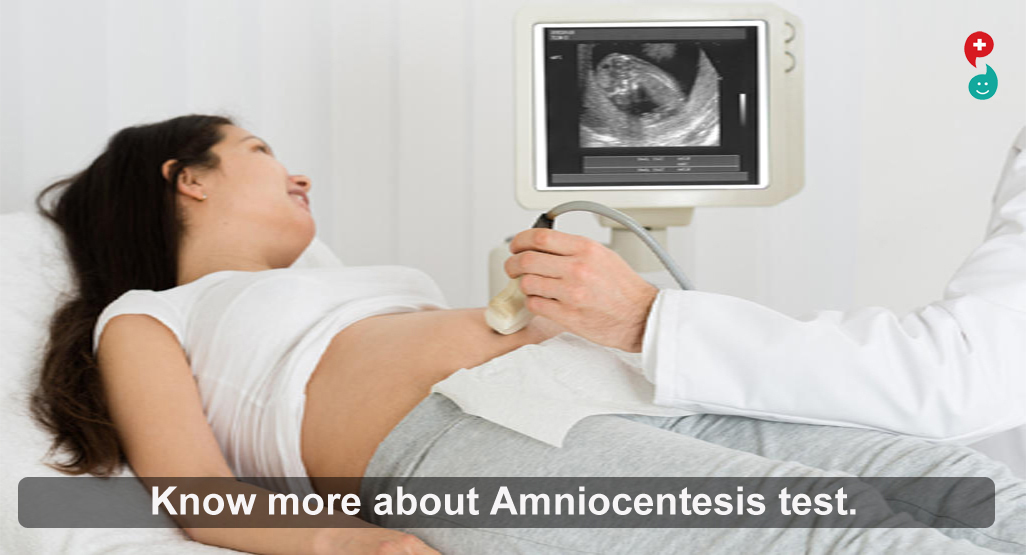
What Is Amniocentesis test?
Amniocentesis is a prenatal test in which a small amount of amniotic fluid is removed from the sac surrounding the foetus for testing. The sample of amniotic fluid (less than one ounce) is removed through a fine needle inserted into the uterus through the abdomen, under ultrasound guidance. The fluid is then sent to a laboratory for analysis. Different tests can be performed on a sample of amniotic fluid, depending on the genetic risk and indication for the test.
Why Is an Amniocentesis performed?
A complete anatomical ultrasound will be done prior to amniocentesis. but amniocentesis is performed to look for certain types of birth defects, such as Down syndrome, a chromosomal abnormality.Because amniocentesis presents a small risk for both the mother and her baby, the prenatal test is generally offered to women who have a significant risk for genetic diseases,including those who:
1) Have an abnormal ultrasound or abnormal lab screens
2) Have a family history of certain birth defects
3) Have previously had a child or pregnancy with a birth defect
Amniocentesis does not detect all birth defects, but it can be used to detect the following conditions if the parents have a significant genetic risk:
1) Down syndrome
2) Sickle cell disease
3) Cystic fibrosis
4) Muscular dystrophy
5) Tay-Sachs and similar diseases
6) Amniocentesis can detect certain neural tube defects (diseases where the brain and spinal column don't develop properly), such as spina bifida and anencephaly.
Because ultrasound is performed at the time of amniocentesis, it may detect birth defects that are not detected by amniocentesis (such as cleft palate, cleft lip, club foot, or heart defects). There are some birth defects, however, that will not be detected by either amniocentesis or ultrasound. An amniocentesis can also be done during the third trimester of the pregnancy to determine if the baby's lungs are mature enough for delivery, or to evaluate the amniotic fluid for infection.
When is amniocentesis performed?
If your doctor has recommended an amniocentesis, the procedure is usually scheduled between the 15th and 18th week of pregnancy.
How accurate is amniocentesis?
The accuracy of amniocentesis is about 99.4%. Amniocentesis may occasionally be unsuccessful due to technical problems, such as being unable to collect an adequate amount of amniotic fluid or failure of the collected cells to grow when cultured.
Does Amniocentesis have risks?
Yes. There is a small risk that an amniocentesis could cause a miscarriage (less than 1%, or approximately 1 in 200 to 1 in 400). Injury to the baby or mother, infection, and pre term labour are other potential complications that can occur, but are extremely rare.
Can you choose not to have an Amniocentesis?
Yes. You will receive genetic counselling before the procedure. After the risks and benefits of amniocentesis have been thoroughly explained to you, you can choose whether or not you want to have the procedure.
What happens during an Amniocentesis?
A small area of the abdomen is cleansed with an antiseptic to prepare for the amniocentesis. You may receive a local aesthetic (pain-relieving medication) to reduce any discomfort. The doctor first locates the position of the foetus and placenta with an ultrasound. Under ultrasound guidance, the doctor inserts a thin, hollow needle through your abdomen and uterus, and into the amniotic sac, away from the baby. A small amount of fluid (less than an ounce) is removed through the needle and sent for laboratory analysis. You may feel minor menstrual-like cramping or discomfort during the amniocentesis or for a few hours after the procedure.
Can you resume normal activities after an Amniocentesis?
After an amniocentesis, it is best to go home and relax for the remainder of the day. You should not exercise or perform any strenuous activity, lift anything over 20 pounds (including children), and you should avoid sexual relations. You may take two Tylenol (acetaminophen) every 4 hours to relieve discomfort. The day after the procedure, you may resume all of your normal activities unless otherwise directed by your doctor.
When should you call your Doctor after an Amniocentesis?
Call your doctor if you develop a fever or have bleeding, vaginal discharge, or abdominal pain that is more severe than cramps.
When will you receive the results of the Amniocentesis?
The results of the amniocentesis are generally available within 2-3 weeks.







